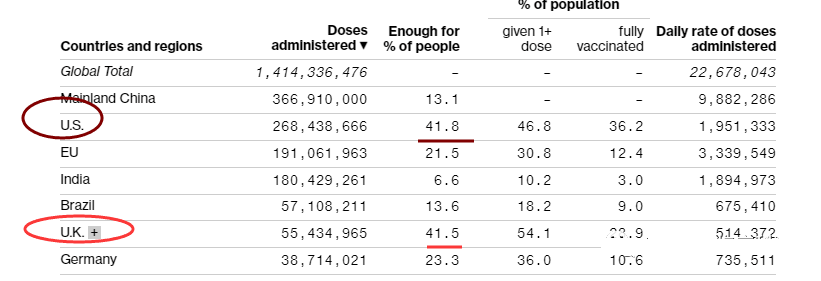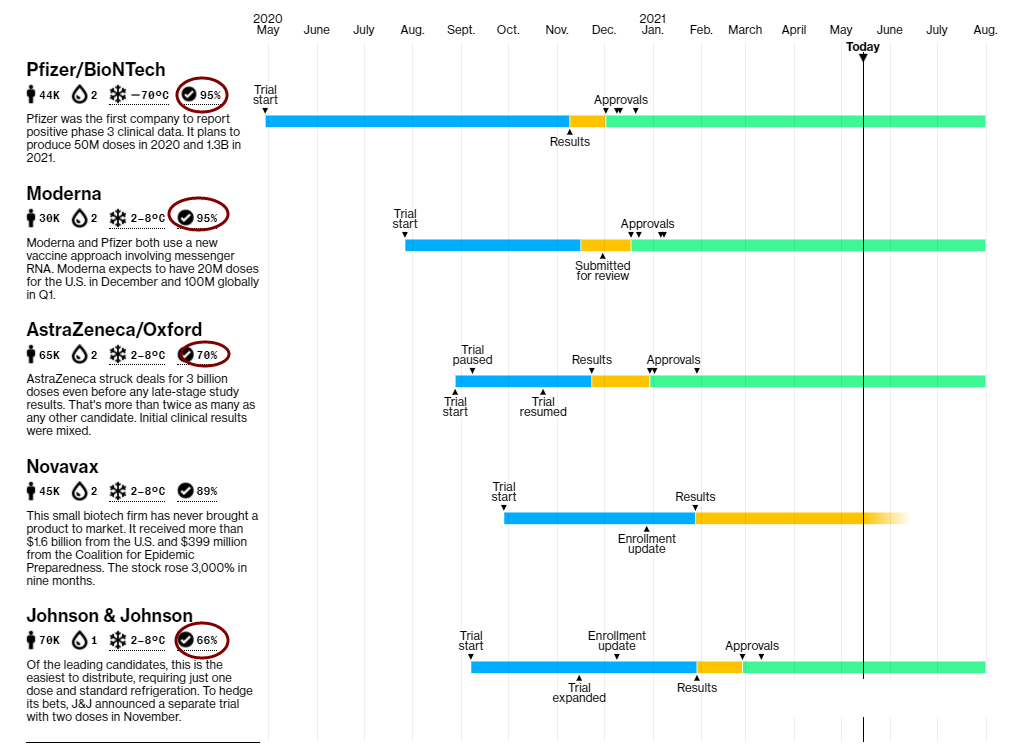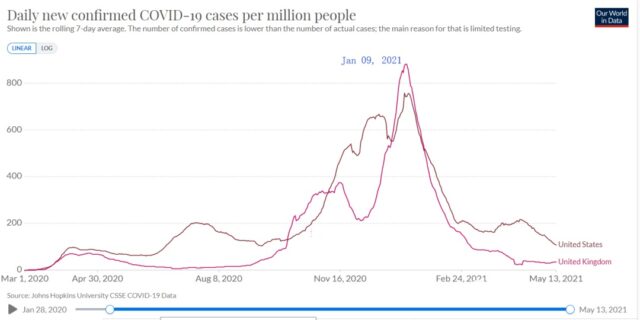COVID-19 vaccine: What is the best time between the first and second dose?
- Normal Liver Cells Found to Promote Cancer Metastasis to the Liver
- Nearly 80% Complete Remission: Breakthrough in ADC Anti-Tumor Treatment
- Vaccination Against Common Diseases May Prevent Dementia!
- New Alzheimer’s Disease (AD) Diagnosis and Staging Criteria
- Breakthrough in Alzheimer’s Disease: New Nasal Spray Halts Cognitive Decline by Targeting Toxic Protein
- Can the Tap Water at the Paris Olympics be Drunk Directly?
COVID-19 vaccine: What is the best time between the first and second dose?
COVID-19 vaccine: What is the best time between the first and second dose? U.S. and U.K used different vaccination strategy, which is the best?
At the beginning of 2020, driven by a series of holiday family gatherings and personnel movements such as Thanksgiving, Christmas, and New Year, the number of new cases in Europe and the United States increased sharply, and the number of new cases in a single day continued to break new highs.

(At the end of 2020, cases in the United Kingdom and the United States have soared. Source: Data World)
For this reason, the United Kingdom and the United States took the lead in approving the clinical application of the COVID-19 vaccine through emergency use authorization, and the public is enthusiastically vaccinated. In this case, some scientists call for a change in the vaccination strategy, postpone the second vaccination (booster vaccination) of some people, and give more vaccines to more people. Regarding this subject, European and American scholars have launched a fierce debate, and we also made a tweet on January 3.
The epidemic situation in Europe and the United States is in a hurry, and people line up for vaccination. Scholars argue strongly: Can only one dose of vaccine be given first?
In the end, the United Kingdom and the United States adopted different vaccination strategies.
- United States continues the vaccination strategy in clinical trials: two-dose vaccination, with a 3-week interval between Pfizer vaccine and a 4-week interval between Moderna vaccine.
- United Kingdom has adopted a bold vaccination strategy: two doses of vaccination, but some vaccinators postpone the second dose of vaccination to 12 weeks to maximize the number of vaccinations.

Four months have passed. What are the epidemics in the United Kingdom and the United States and the level of antibodies induced after the two doses of vaccination?
First, let’s look at the ratio of the two vaccinations.
In terms of the number of inoculations, 41.8% in the United States and 41.5% in the United Kingdom are almost the same.
However, due to different vaccination strategies, if the proportion of people receiving more than one dose and the proportion of full vaccination are used, the difference is very large.
- 46.8% of the population in the United States has completed more than one dose of vaccination, but 36.2% of the population is fully vaccinated.
- 54.1% of the population in the UK has completed more than one dose of vaccination, which is higher than the United States; but only 28.9% of the population is fully vaccinated, which is lower than the United States.

(Vaccination ratio. Source: Bloomberg)
Secondly, compare the vaccines vaccinated in the United States and Britain.
The main vaccines vaccinated in the United States are Pfizer and Moderna’s mRNA vaccines. The two doses of protection are 95% and 94% respectively. There is also the Johnson & Johnson vaccine, which has a protection of 66%. After the discovery of fatal venous thrombosis, the Johnson & Johnson vaccine has almost always In a state of suspension of vaccination.
The United Kingdom approved Pfizer’s mRNA vaccine and AstraZeneca’s adenovirus vector vaccine with 95% and 70% protection, respectively. These two are the mainstays of British vaccination. Later, Moderna’s mRNA vaccine was approved with a protection of 94%.
In terms of protection alone, the protection of vaccines vaccinated in the United States is higher than that vaccinated in the United Kingdom.

(The protective power of vaccines. Source: Bloomberg)
How’s the effect?
From the perspective of epidemic control
The United Kingdom is significantly better than the United States, reducing the number of new cases earlier and more significantly.
In the past week, the average number of new cases per million people in a single day in the United States was 111, while the number of new cases in the United Kingdom was only 34, and the United Kingdom was one-third of the United States. This fully shows that the ratio of vaccination is more important.

(After vaccination, the number of new cases in the United Kingdom and the United States has decreased, and the United Kingdom is even more pronounced. Source: Data World)
From the point of view of induced antibodies,
in people over 80 years old, postponing the second dose of Pfizer mRNA vaccine can increase the antibody response after the second dose by more than 3 times. In other words, the vaccination strategy adopted in the UK can induce higher immune antibodies.
Expert Comments:
By comparing the different vaccination strategies adopted in the United States and the United Kingdom, it is shown that postponing the second dose has significant benefits: from the perspective of the epidemic situation, the effect of epidemic control is better when the vaccination is postponed; from the laboratory study, it is postponed to 12 weeks Vaccination can induce higher immune antibodies.
However, it should be noted that in addition to the impact of vaccination rates, epidemic control is also affected by non-drug interventions such as wearing masks, staying at home, and social distancing. In addition, the conclusion that delayed vaccination makes the immune antibody higher comes from Pfizer vaccine. For other vaccines, research data is needed.
But in any case, the British vaccination strategy provides a very important and effective experience for outbreak areas: postponing the second dose of vaccination to 12 weeks, the effect is better.
COVID-19 vaccine: What is the best time between the first and second dose?
(source:internet, reference only)
Disclaimer of medicaltrend.org
Important Note: The information provided is for informational purposes only and should not be considered as medical advice.



